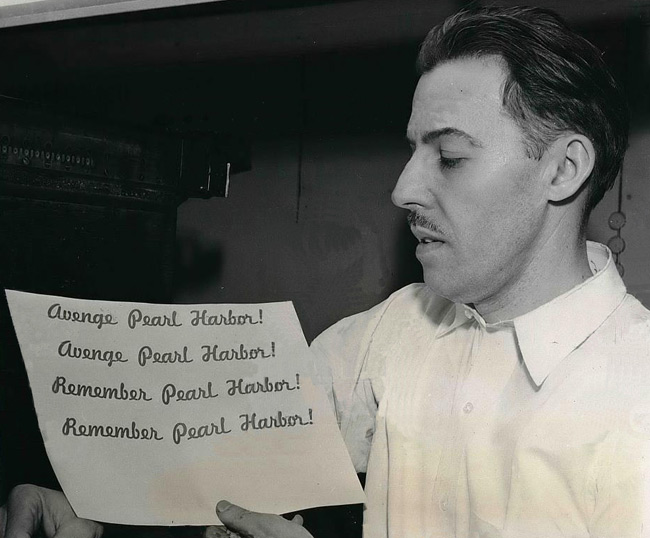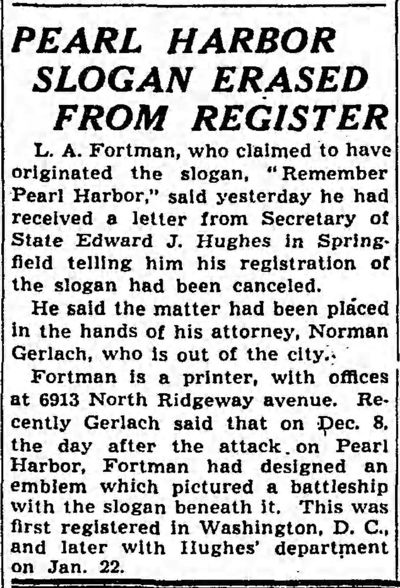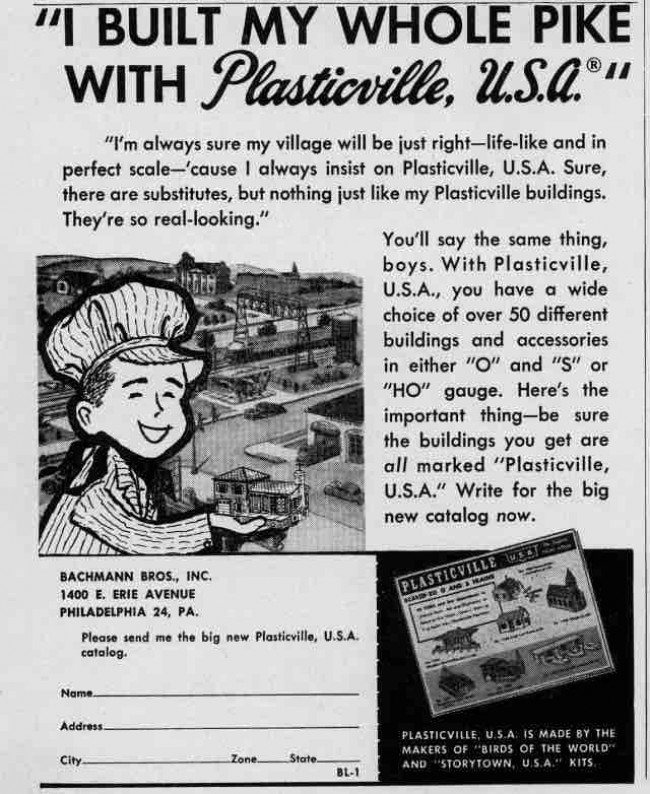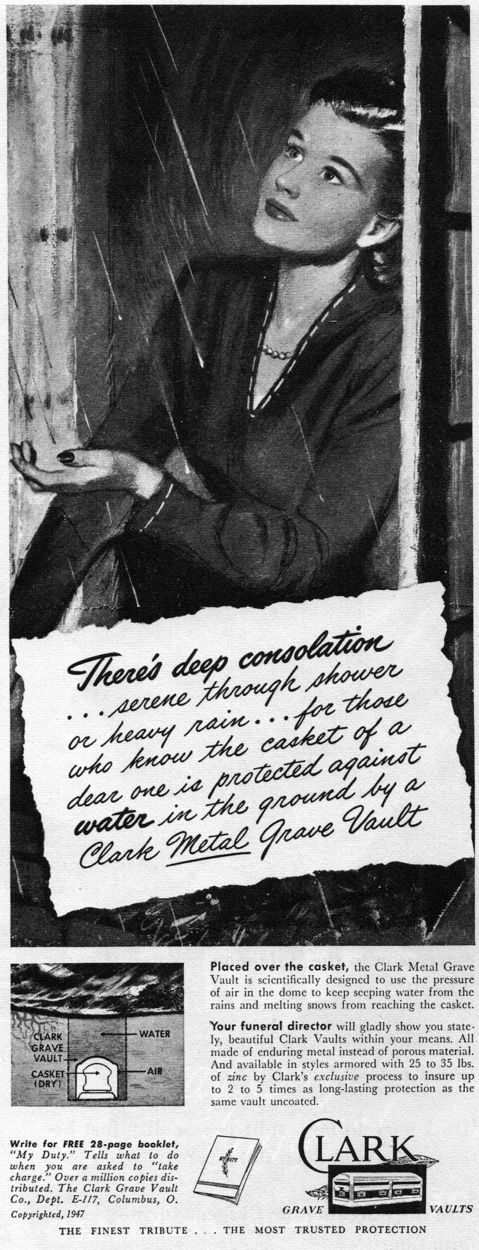1940s
Owen Smells and Mary Knows
In its July 5, 1943 issue, Time magazine noted the marriage in Pryor, Montana of Owen Smells and Mary Knows.The marriage only lasted three years, but in that time they had a daughter, Theresa, who eventually married Joseph Rock Above and became Theresa Smells Rock Above.
Findagrave.com lists a grave for Owen Smells which may or may not be the same Owen that married Mary. I'm not sure. But the dates seem about right.

Helena Independent Record - Oct 1, 1946

Posted By: Alex - Thu Dec 08, 2016 -
Comments (1)
Category: Odd Names, Marriage, 1940s
Remember Pearl Harbor
December 1941: Following the Japanese attack on Pearl Harbor, Chicago printer Louis Fortman claimed exclusive right in Illinois to the use of the slogans "Remember Pearl Harbor" and "Avenge Pearl Harbor," insisting that he had originated and printed the slogans on December 8 and had registered them under the state's patent and trademark laws. Anyone wishing to use the slogans would need his permission — and would need to pay him. However, Fortman said he was willing to let them be used, at no charge, for "patriotic purposes and to aid defense activities."In response to public outrage, Illinois Secretary of State Edward J. Hughes canceled Fortman's registration of the slogans.


Chicago Daily Tribune - Feb 4, 1942

Chicago Daily Tribune - Mar 28, 1942
Posted By: Alex - Wed Dec 07, 2016 -
Comments (6)
Category: Patriotism, 1940s
The New Look in Hot Water Bottles
From 1948. Dreamed up by the folks at B.F. Goodrich.And it's still a popular look in S&M gear.


The Akron Beacon Journal - Jan 1, 1948

Palm Beach Post - Jan 5, 1948
Posted By: Alex - Thu Dec 01, 2016 -
Comments (4)
Category: Inventions, 1940s
Marriage Bureau
Wait a minute--I don't see how the instant Tinder hookup booty-call sex happens!
Posted By: Paul - Sat Nov 26, 2016 -
Comments (3)
Category: Weddings and Marriage, 1940s
Lush Head Woman
"Get a lush head woman and lose your health!"
Posted By: Paul - Fri Nov 25, 2016 -
Comments (0)
Category: Domestic, Music, 1940s, Alcohol
7-11 Curbside Service
An early example of ordering goods while seated in comfort, and then getting the stuff delivered.
Posted By: Paul - Sun Nov 13, 2016 -
Comments (5)
Category: Business, 1940s
The Palatability of Eggs

Dr. Hugh Cott
He assembled a panel of three egg tasters, who were served the eggs scrambled. They then rated them on a 10-point scale. Over a six-year period (1946-1951) they tasted eggs from 212 bird species.
Some of their results: The domestic hen was rated tastiest (8.8 out of 10). The coot, moorhen, and lesser black-backed gull came in second place (8.3 out of 10).
Penguin eggs were "particularly fine and delicate in flavor." Domestic duck eggs were of only "intermediate palatability."
Coming in at the bottom were the eggs of the great tit ("salty, fishy, and bitter"), wren ("sour, oily"), and the oyster-catcher ("strong onion-like flavor"). The eggs of the bar-headed goose made the tasters gag. However, "The freshness of the material available may have been in question."
Cott concluded that brightly colored eggs were, overall, less palatable than camouflaged eggs, but this result has subsequently been challenged. Zoologist Tim Birkhead has also suggested that Cott's experiment would have been more scientifically valuable if the tasters had eaten the eggs raw, because "What predators ever experienced cooked eggs?"
Cott published the full results of his experiment in 1954, in the Journal of Zoology.

The Bend Bulletin - Feb 2, 1948
Posted By: Alex - Wed Nov 02, 2016 -
Comments (2)
Category: Food, Eggs, Experiments, 1940s
Plasticville, USA

Original ad here.
With no trace of modern irony, Plasticville USA was once deemed a grand name for an imaginary town. Somehow I can hear a beatnik of the era saying, "Plasticville, man, that's for squares!"
Wikipedia entry here.
More info and some great pictures on this page.
More images via Google.
Posted By: Paul - Sun Oct 23, 2016 -
Comments (3)
Category: Toys, Urban Life, Bohemians, Beatniks, Hippies and Slackers, 1940s, 1950s
Milka Moo
Introduced in 1948, the "Milka Moo" toy cow had a rubber udder that, when squeezed, would squirt out real milk.It was one of the many inventions of Beulah Louise Henry (aka Lady Edison). Her inventions made her rich, but she was considered a bit of an eccentric. She lived in New York hotels along with "three sizeable live turtles, a dozen tropical fish, a school of snails and other flora and fauna."


Des Moines Register - Mar 14, 1948

St. Louis Post-Dispatch - Dec 5, 1948

The Indianapolis Star - Aug 21, 1948
Posted By: Alex - Mon Oct 03, 2016 -
Comments (1)
Category: Eccentrics, Toys, 1940s
Clark Metal Grave Vault
Rain protection for the dearly departed.
I found this ad reproduced in Marshall McLuhan's The Mechanical Bride (1951). He comments:
Unfortunately, McLuhan never specified where he found the ad. But it's listed in a 1947 catalog of copyright entries. So must be a 1947 ad.
Posted By: Alex - Sun Oct 02, 2016 -
Comments (5)
Category: Death, Advertising, 1940s

| Who We Are |
|---|
| Alex Boese Alex is the creator and curator of the Museum of Hoaxes. He's also the author of various weird, non-fiction, science-themed books such as Elephants on Acid and Psychedelic Apes. Paul Di Filippo Paul has been paid to put weird ideas into fictional form for over thirty years, in his career as a noted science fiction writer. He has recently begun blogging on many curious topics with three fellow writers at The Inferior 4+1. Contact Us |




